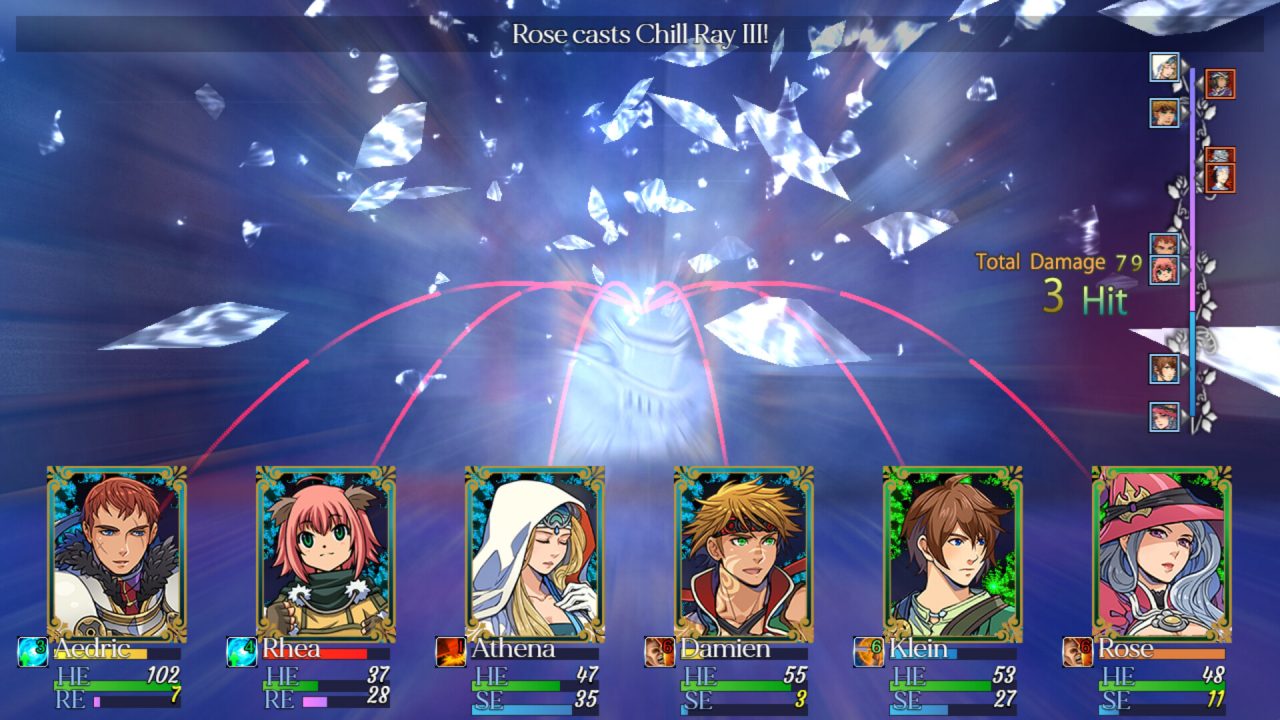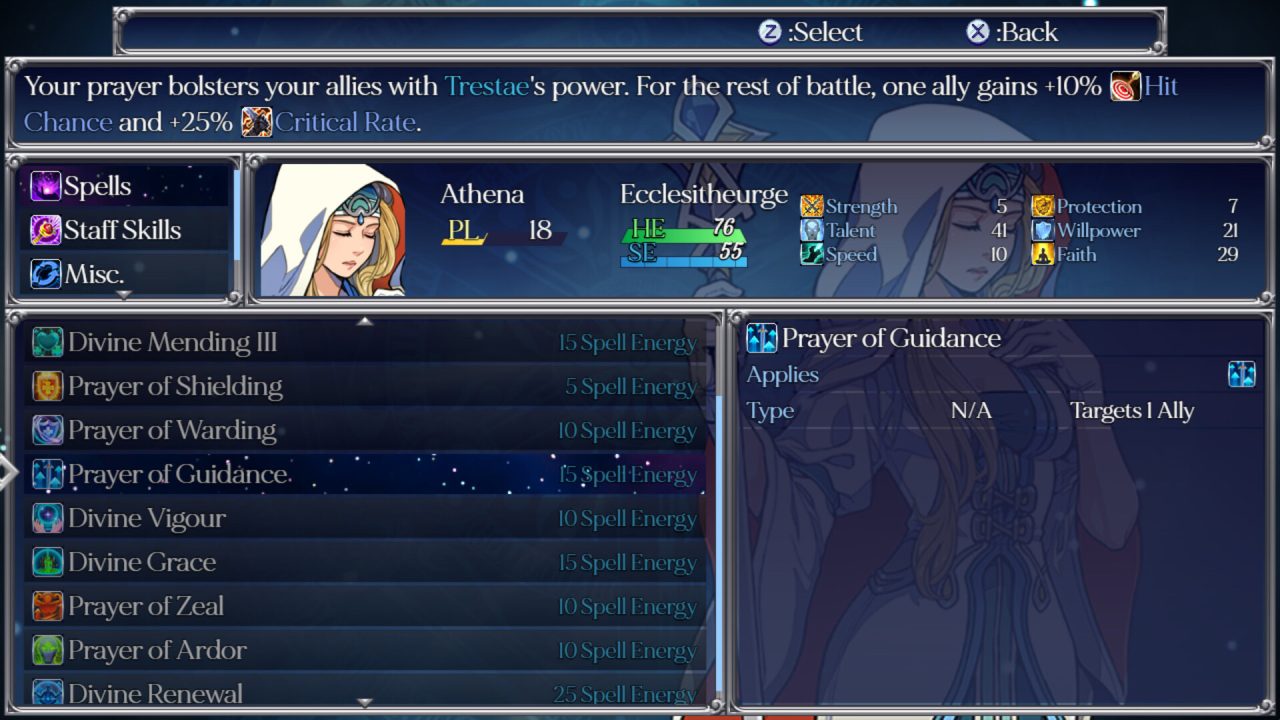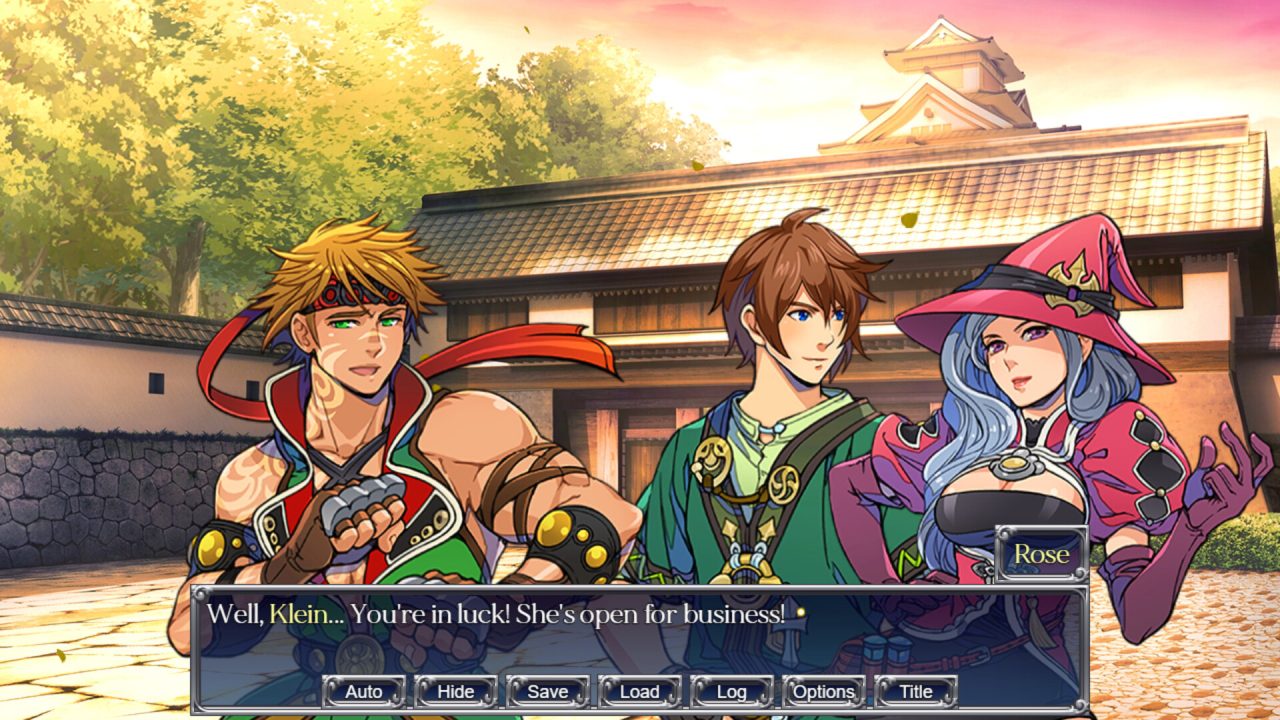Trials are steep challenges that someone must overcome. A fitting description, as the main character Aedric in the visual novel/RPG hybrid Trials of Kokoro must overcome several intense trials after he wakes up in a forest with no memory save for his name. Found by a young girl named Rhea, herself on a quest to save the life of a dear friend, can Aedric piece together the mysteries of his past as he goes on a journey to face obstacles he can’t even fathom? What fate awaits Aedric, and how does his quest for self-discovery tie into a battle for the fate of the entire world?
Trials of Kokoro is a fantasy set in the world of Vitaria, which also serves as the setting for TD Games’ previous RPG adventure, Trials of Guinevere. You don’t need familiarity with the previous title to enjoy this one. Indeed, much like our amnesiac hero, Aedric himself, you learn about the world of Vitaria as you progress. The world-building is impressive in this linear-progressing adventure, setting up a compelling and fully fleshed-out fantasy story. In Trials of Kokoro, the chosen of the gods walk amongst the rank and file, those gifted with wind magic can help airships stay aloft in the skies, and nature spirits wander the lands despite a sometimes strained relationship with people. There are certain tropes you’ve come to expect from fantasy tales in this game, but they’re well-explored and entertainingly told.
Trials of Kokoro centers around six characters, four of whom make up your active battle party. Of course, Aedric is wonderfully naive about much of the world thanks to his memory loss but always willing to lend a helping hand. Then there’s brawler Rhea, who lets her fists do the talking in combat with a cheerful energy that belies her youth and a desire to do right by those who show her kindness. The sibling bond she develops with the rest of the main cast is adorable. There’s also the self-doubting Athena, a priestess with powerful healing skills who doesn’t have the best confidence due to past decisions but who still tries her hardest regardless. Damien is the last active party member to join the cast, loyal to those who earn his trust but exceedingly paranoid until that happens.
Damien’s friends, expert wind magic user Klein and his capable partner Rose, also play an essential role in the plot. Klein, in particular, gets a moving character arc at the game’s halfway point, and Rose is realistically dealing with the aftermath of a horrifically traumatic event. They often serve as guest party members during crucial fights. There are also several memorable supporting characters throughout the game’s cast, such as Mia, the enthusiastic shopkeeper with a close connection to Damien. The various bonds between the party and other characters help Trials of Kokoro‘s plot and its later story beats remain engaging.
As stated earlier, Trials of Kokoro is a fairly linear game. You get visual novel-style story scenes to help move things along, then fight a battle or chain of battles. You do have opportunities to manage your party, rest, and shop, depending on where you are in the game. Then you see more story scenes and fight again. The whole process repeats until you reach the game’s touching ending. You only get real interactivity through party management, shopping for gear and items, and battling various foes. Those who aren’t the biggest fans of visual novel story progression might not appreciate how much the game plays like one. However, VN fans will find much to enjoy in the presentation, while RPG fans will find solid and robust progression and combat systems to keep them entertained.
Under the hero management selection, you access menus for the party that allow you to equip new weapons and armor to their persons, including status and ability-boosting gems. As the party acquires experience through fighting and characters level up, they bolster their various stats and gain a power point that they can use to learn a new skill specific to their party role. For instance, Aedric learns weapon-enhancing abilities, while Athena’s spells are more restorative or protective. You get to choose the order in which characters unlock their abilities, helping to add your tactical edge to combat. I relied extensively on Athena’s healing and Damien’s offensive spell-casting, so I prioritized learning those abilities before others.
Admittedly, that gameplay component makes certain fights more difficult in the long run. I quickly discovered combat in Trials of Kokoro significantly emphasizes status effects. Negative and positive statuses stack up in fights, with a large impact on how they ultimately play out. It’s easy to get overwhelmed in combat, even against non-boss enemies, if you aren’t paying attention to the status spells inflicted on your party. You want to devote a significant chunk of time to either enhancing and buffing the party or removing debuffs. There’s a fundamental level of strategy in fights, and the game’s turn-based combat provides a decent challenge. Aside from the core battle party of Aedric, Athena, Rhea, and Damien, several fights feature guest party members controlled by the AI. Taking into account their abilities and keeping them boosted and healthy along with the main party becomes a significant component of battles. The combat in Trials of Kokoro is surprisingly fast-paced and enough to keep you on your toes throughout the game alongside the relatable plot.
Visually, Trials of Kokoro’s art direction and visual novel presentation are gorgeous. I love the anime-styled character portraits and CG illustrations that appear at significant moments throughout the narrative. The level of detail and expression in the artwork is phenomenal. The UI is clear and precise, visually appealing while not distracting. This title is a game with a lot of visual polish. The only thing that takes some getting used to is how the character portraits “jump” on-screen to indicate when someone is talking. I understand the reasoning behind it, but it’s pretty distracting.
Sound-wise, Trials of Kokoro uses various sound effects extensively, especially during intense fights. Blades clashing, grunts of exertion, an elemental spell hitting its mark: all are used to significant effect. The game’s soundtrack is phenomenal, especially the high-intensity and often orchestral-tinged battle themes. I’m impressed by the soundscape overall! Regarding the game’s script, the English version is flawless, without a grammatical or typographical error.
There’s not much negative I can say about Trials of Kokoro without falling into extreme nitpicking territory. It’s a very well-polished game that does what it sets out to do. Those who aren’t the biggest fans of RPGs with VN presentation might not be as keen to pick it up, but those who don’t mind VN/RPG hybrids will find much to appreciate. The game’s linear progression might also be off-putting, but I had so much fun with the combat, party management, and plot progression that I didn’t mind that aspect. For those that Trials of Kokoro will appeal to, this is an entertaining journey to Vitaria and a trial worth overcoming.





